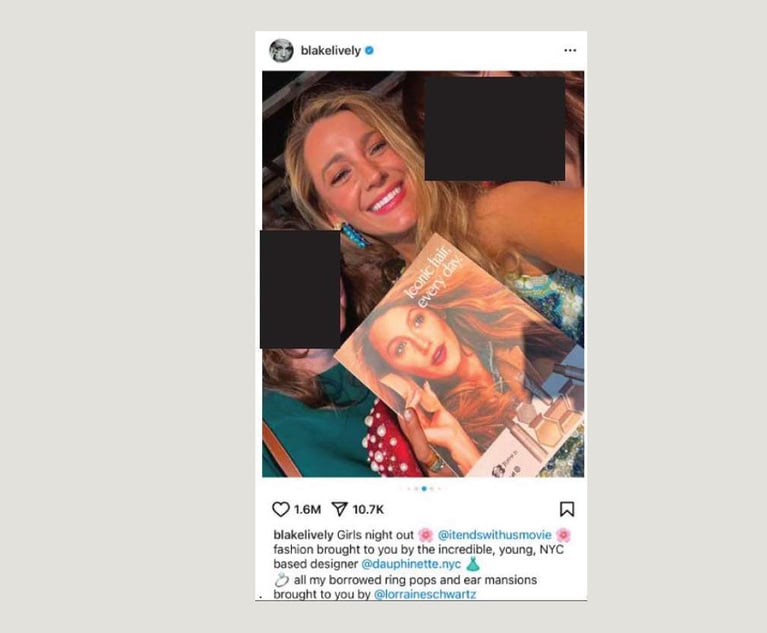Juror Bias Raised in Upcoming SF Trial Over Monsanto's Roundup
A federal judge said he would break out prospective jurors during voir dire who knew about this year's $289 million verdict, according to a lawyer familiar with the decision.
December 10, 2018 at 07:26 PM
6 minute read
 RoundUp weed killer.
RoundUp weed killer.
A San Francisco judge overseeing the first Roundup trial in federal court has agreed to separate out prospective jurors who know about this year's groundbreaking $289 million verdict against Monsanto, according to a lawyer familiar with the decision.
Monsanto, facing trial in two months, had asked U.S. District Judge Vince Chhabria of the Northern District of California to strike prospective jurors who might have “particularized knowledge” about the jury's Aug. 10 award for plaintiff Dewayne “Lee” Johnson. Chhabria's order, made at a Dec. 5 hearing, stopped short of Monsanto's request but would allow for separate groups of jurors during voir dire based on whether they knew about the verdict.
Chris Loder, vice president of communications at Bayer, which acquired Monsanto this year, said in an emailed statement that the company's “goal is to have a fair trial, and we will continue to do what we can to ensure that we have an impartial and unbiased jury that will decide the case on the evidence before it and nothing more.”
“Regarding the jury selection process in the federal MDL, in addition to using a jury questionnaire, the court has agreed to separate potential jurors into those who are aware of the verdict in Johnson and those who are not. We believe these are positive steps towards preventing the risk of prejudice among jurors in these cases,” Bayer added.
Plaintiffs lawyers—Aimee Wagstaff of Andrus Wagstaff in Lakewood, Colorado; Robin Greenwald of New York's Weitz & Luxenberg; and Michael Miller of The Miller Firm in Orange, Virginia—did not respond to requests for comment.
In a Nov. 30 letter, Monsanto's lawyers wrote that the likelihood of a tainted jury pool in San Francisco, particularly given the publicity over the first verdict for plaintiff Johnson was “substantial.”
“This is not simply a case where a substantial percentage of the jury pool bears some general animus against one of the parties,” wrote Washington, D.C., lawyers Brian Stekloff, of Wilkinson Walsh + Eskovitz, and Eric Lasker, of Hollingsworth, as well as Los Angeles attorney Pamela Yates at Arnold & Porter Kaye Scholer. “Here, there is substantial animus toward Monsanto, which is compounded by publicity surrounding the Johnson verdict.”
Plaintiffs lawyers, in a Nov. 30 court filing, said Chhabria did not have to go through a separate voir dire process to weed out jurors with knowledge of the verdict, which San Francisco Superior Court Judge Suzanne Bolanos reduced by more than $200 million.
“Here, media coverage concerning the Johnson case, and general Roundup litigation, does not rise to the level of concern to create a presumption of prejudice,” they wrote. They noted that San Francisco was a large metropolitan area and that news reports about Roundup had been “largely factual.”
Moreover, the filing continued, they have concerns about paid “news” articles that they allege Monsanto used to taint the jury pool in the first trial.
“This prejudicial media, presumably paid for by Monsanto and targeting the Bay Area, could easily have contaminated the jury against the plaintiffs,” they wrote.
Chhabria, who is overseeing more than 600 lawsuits over Roundup, has scheduled the bellwether trials to start in 2019, with the first group involving four cases brought in his district, the Northern District of California.
The first trial, set to begin Feb. 25, involves Edwin Hardeman, 70, who sprayed Roundup to control poison oak and weeds on his property in Sonoma County starting in the 1980s. He was diagnosed with non-Hodgkin's lymphoma in 2015.
Monsanto began raising concerns about juror bias soon after the Johnson trial. In an Oct. 22 update to the court, Monsanto insisted on “additional precautions” in the next trial, such as having more than 500 prospective jurors available, a separate questionnaire about media exposure and a gag order preventing lawyers from talking to the press during jury selection.
Chhabria prompted letters from both sides in ordering them to each address the juror issue.
In its letter, Monsanto did not seek a change in venue. Rather, the St. Louis-based company wanted Chhabria to automatically strike prospective jurors who have “particularized knowledge” about the first verdict.
“Monsanto believes that specific knowledge of the Johnson verdict is precisely the type of highly prejudicial information for which bias should be presumed,” they wrote. “Given the stakes of this lead trial, the safer course is to conduct the additional voir dire to ensure an unbiased jury.”
Monsanto cited “inflammatory news coverage,” an opinion article in the San Francisco Chronicle written by celebrities Neil Young and Daryl Hannah, and online and social media blogs. Monsanto also hired a marketing research expert whose survey, attached to the letter, found that 40 percent of respondents who knew about Monsanto said they “would rule against Monsanto in a hypothetical lawsuit” and that 33 percent knew about the Johnson verdict.
“Not surprising,” Monsanto's lawyers wrote, “respondents with knowledge of the Johnson verdict were more likely to harbor animus toward Monsanto.”
But plaintiffs' lawyers, in their letter, wrote that an ordinary voir dire would suffice—then raised their own questions about Monsanto tainting the jury pool. In addition to paid “news” articles, they criticized Scott Partridge, former general counsel of Monsanto who is now general counsel for Bayer's U.S. operations, for “spreading falsehoods” in media interviews soon after the verdict.
In a footnote, they wrote: “Plaintiffs are currently engaging in discovery to determine if, in fact, Monsanto was attempting to covertly contaminate the jury pool during the Johnson trial by promoting misleading news articles at Bay Area residents. Depending on what plaintiffs discover, plaintiffs may seek special relief from the court to enjoin any attempt to tamper with the jury in Hardeman.”
This content has been archived. It is available through our partners, LexisNexis® and Bloomberg Law.
To view this content, please continue to their sites.
Not a Lexis Subscriber?
Subscribe Now
Not a Bloomberg Law Subscriber?
Subscribe Now
NOT FOR REPRINT
© 2025 ALM Global, LLC, All Rights Reserved. Request academic re-use from www.copyright.com. All other uses, submit a request to [email protected]. For more information visit Asset & Logo Licensing.
You Might Like
View All
Morgan Lewis Shutters Shenzhen Office Less Than Two Years After Launch

Texas-Based Ferguson Braswell Expands in California With 6-Lawyer Team From Orange County Law Firm
2 minute read

Justin Baldoni Sues Blake Lively and Ryan Reynolds for $400M in New Step in 'It Ends With Us' Fight
6 minute readTrending Stories
- 1'A Death Sentence for TikTok'?: Litigators and Experts Weigh Impact of Potential Ban on Creators and Data Privacy
- 2Bribery Case Against Former Lt. Gov. Brian Benjamin Is Dropped
- 3‘Extremely Disturbing’: AI Firms Face Class Action by ‘Taskers’ Exposed to Traumatic Content
- 4State Appeals Court Revives BraunHagey Lawsuit Alleging $4.2M Unlawful Wire to China
- 5Invoking Trump, AG Bonta Reminds Lawyers of Duties to Noncitizens in Plea Dealing
Who Got The Work
J. Brugh Lower of Gibbons has entered an appearance for industrial equipment supplier Devco Corporation in a pending trademark infringement lawsuit. The suit, accusing the defendant of selling knock-off Graco products, was filed Dec. 18 in New Jersey District Court by Rivkin Radler on behalf of Graco Inc. and Graco Minnesota. The case, assigned to U.S. District Judge Zahid N. Quraishi, is 3:24-cv-11294, Graco Inc. et al v. Devco Corporation.
Who Got The Work
Rebecca Maller-Stein and Kent A. Yalowitz of Arnold & Porter Kaye Scholer have entered their appearances for Hanaco Venture Capital and its executives, Lior Prosor and David Frankel, in a pending securities lawsuit. The action, filed on Dec. 24 in New York Southern District Court by Zell, Aron & Co. on behalf of Goldeneye Advisors, accuses the defendants of negligently and fraudulently managing the plaintiff's $1 million investment. The case, assigned to U.S. District Judge Vernon S. Broderick, is 1:24-cv-09918, Goldeneye Advisors, LLC v. Hanaco Venture Capital, Ltd. et al.
Who Got The Work
Attorneys from A&O Shearman has stepped in as defense counsel for Toronto-Dominion Bank and other defendants in a pending securities class action. The suit, filed Dec. 11 in New York Southern District Court by Bleichmar Fonti & Auld, accuses the defendants of concealing the bank's 'pervasive' deficiencies in regards to its compliance with the Bank Secrecy Act and the quality of its anti-money laundering controls. The case, assigned to U.S. District Judge Arun Subramanian, is 1:24-cv-09445, Gonzalez v. The Toronto-Dominion Bank et al.
Who Got The Work
Crown Castle International, a Pennsylvania company providing shared communications infrastructure, has turned to Luke D. Wolf of Gordon Rees Scully Mansukhani to fend off a pending breach-of-contract lawsuit. The court action, filed Nov. 25 in Michigan Eastern District Court by Hooper Hathaway PC on behalf of The Town Residences LLC, accuses Crown Castle of failing to transfer approximately $30,000 in utility payments from T-Mobile in breach of a roof-top lease and assignment agreement. The case, assigned to U.S. District Judge Susan K. Declercq, is 2:24-cv-13131, The Town Residences LLC v. T-Mobile US, Inc. et al.
Who Got The Work
Wilfred P. Coronato and Daniel M. Schwartz of McCarter & English have stepped in as defense counsel to Electrolux Home Products Inc. in a pending product liability lawsuit. The court action, filed Nov. 26 in New York Eastern District Court by Poulos Lopiccolo PC and Nagel Rice LLP on behalf of David Stern, alleges that the defendant's refrigerators’ drawers and shelving repeatedly break and fall apart within months after purchase. The case, assigned to U.S. District Judge Joan M. Azrack, is 2:24-cv-08204, Stern v. Electrolux Home Products, Inc.
Featured Firms
Law Offices of Gary Martin Hays & Associates, P.C.
(470) 294-1674
Law Offices of Mark E. Salomone
(857) 444-6468
Smith & Hassler
(713) 739-1250






